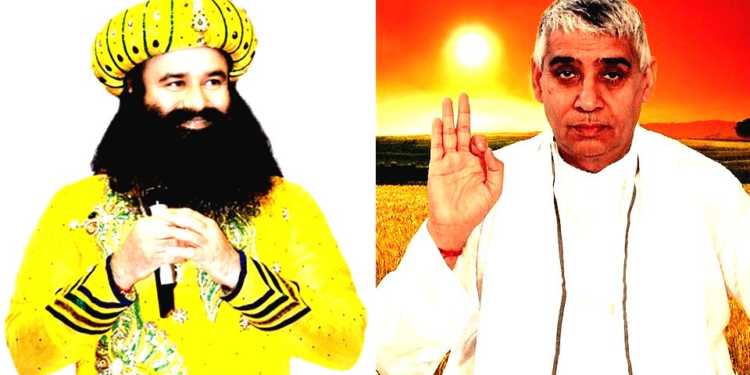This is not the first time that Babas and their Chelas have wreaked havoc in our country. Not so long ago, one Rampal Baba and his supporters had rioted en masse when Police had tried to detain him. Then there was one Ramvriksh Yadav, another cult leader whose disciples engaged in large scale violence and arson in Mathura. Asaram Bapu is another famous Baba who had the nation in thrall before rape allegations emerged against him. And now, Gurmeet Singh Ram Rahim Insan and his Chelas have laid large parts of Haryana to waste. Sadly, the Babas mentioned earlier are just a drop in the ocean of the huge Babadom industry that thrives in the country.
Curiously, while Media and Analysts would have us believe that Babagiri is a unique culture confined to Hinduism, Indian Muslims, Sikhs, Christians and other communities are equally susceptible to hysteria resulting from adulation of a Baba. While claiming to decipher the spiritual truth for their followers, most of these Babas are professional Businessmen with interests ranging from spirituality to education, politics to infrastructure and perhaps the underworld as well.
There are two factors which contribute to the Babagiri industry in the country.
- The first is the historical Bhakti movement which spawned spiritual leaders who shone the light of truth in the eyes of their disciples. They translated complex and arcane philosophical concepts into a language the masses could understand. Saints such as Dnyaneshwar, Tukaram, Nanak, Chaitanya Mahaprabhu, Tulsidas and many others showed the path to salvation by detaching themselves from the world and living a life of poverty and want to be at one with their followers. Their motives were selfless and they were guided solely by the need to provide spiritual solace to the masses.
- The second and related factor is the caste system. Given the oppressive caste hierarchy, lay folk adopted Babas and Sants as their own since in many cases, it was only these Babas and Sants who could show the masses a path towards God. In the modern times, sadly, many Babas and Sants have replaced the emphasis on spirituality with a focus on power and money. The results are catastrophic and for everyone to see.
Take the example of Baba Gurmeet Singh Ram Rahim Insan for example. While he is believed to be an upper caste Jat Sikh himself, his followers are mostly lower caste Hindus and Sikhs who have long been discriminated by caste structure. These people, who for generations have suffered discrimination find solidarity and solace by associating themselves with a community that takes care of their spiritual and material needs without the oppression of discrimination that life outside Deras entails. With numbers comes strength, both physical and political, which is why many of these Deras or Communities wield tremendous political power by sealing the fate of political parties contesting in their territory. For instance, Baba Gurmeet could exercise his political power by supporting BJP in Haryana and Akali Dal, with which it has a long running feud, in Punjab. In the past, the Dera has also lent its support to Congress in both states.
While there might be outward differences, some of these Deras are no different from Church organizations that convert lower caste Hindus to their religions. The Church plays exactly the same role as that of a Dera head, helping the convert acculturate to a new environment, insulating him from social challenges he faced earlier, empowering him both spiritually as well as materially and creating a sense of community for those who had formerly been oppressed.
In return, the Church wields political clout, which is frequently seen in states such as Goa, Kerala and parts of North East where the Church effectively issues a diktat asking its followers to vote for or against a political party. Same is case with Muslim organizations, where Salafism is preached and a community of pure-Muslims is created, setting themselves apart from those who defile themselves by following Kaffir customs. Salafis also meddle in politics, spreading their influence far and wide. Take the example of Barkati in Mamata’s Bengal.
The political influence enjoyed by these Deras/Communities leads them to attract political parties across the spectrum. Politically speaking, these communities become a substantial vote bank that can influence the outcomes of elections in regions beyond their base. Political parties eventually become willing accomplices or unwilling spectators in this game. Governments treat them and their leaders with Kid gloves and give them a long rope, overlooking their misdemeanors and crimes. Eventually, one fine day when action needs to be taken, all hell breaks loose and one witnesses scenes as were seen in Haryana recently.
Political will alone cannot rid the nation of this Babagiri industry. But it does play a critical role. Politics plus Babagiri is a potent mix and has the potential to lead to chaos and anarchy.
Education and awareness is the need of the day. Society must also look at ways of helping different people satisfy their spiritual needs without having to go to Godmen and third-party agents. This would be a long-drawn process. Till then perhaps we will sadly see a redux of what happened in Haryana last week.




























